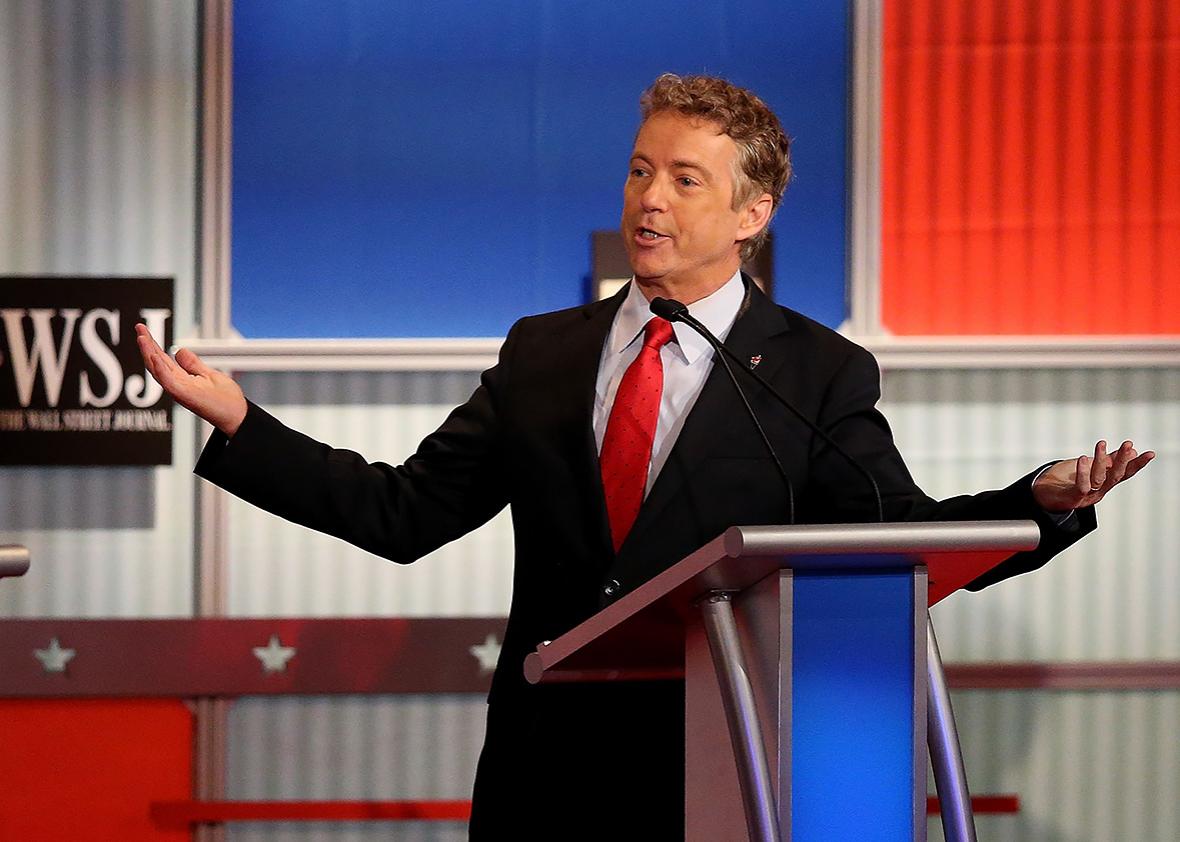Prior to the fourth Republican presidential debate, Sen. Rand Paul hadn’t made much noise in these melees. He had gotten into some interesting policy arguments about issues like medical marijuana but otherwise never seemed center stage. His most memorable moment came in the second debate when Donald Trump opened the night by calling Paul ugly.
His performance in Tuesday’s debate was inarguably his strongest. He was a main participant in some of the night’s liveliest and most central topics, ably pitching both his tax plan and his foreign policy views. It was on the latter where he especially stood out, because let’s face it: All of the candidates have roughly similar views on taxes, in that they think rates should all go way, way down. That’s why you didn’t see many arguments during that portion—just one guy saying, “10 percent individual, 16 percent for business” and another saying, “no, 14 percent individual, 14 percent for business.” Whatever! On foreign policy, the candidates all roughly agree, too, on a more “muscular” use of American military power abroad and the need to “stand up” to various bogeymen.
Except Paul. In adopting what we’ll call a less interventionist foreign policy—not exactly the “isolationist” one that Sen. Marco Rubio, like many hawks before him, has ascribed to Paul—the Kentucky senator, really, was the only markedly different candidate on the stage in either domestic or international policy. This is not new for him. But in the months leading up to his campaign launch and the disappointing months that he’s been an official candidate, Paul hedged in an unsuccessful effort to ditch the “isolationist” label. He is now low in both polls and funds, with little left to lose. His only move, really, is to make a showy display of what made him an interesting candidate in the first place. Maybe it will kill him off; maybe it won’t. But he was going to be dead anyway.
Any neutral observer would look at his exchange with Rubio (and, by proxy, every other candidate) over military spending and declare Rubio the winner. Rubio is a forceful debater, and he represents hawkish, mainstream Republican foreign policy thinking. According to a Pew survey earlier this year, to give just one example, 67 percent of Republican voters supported the deployment of American ground troops to fight the Islamic State in Iraq and Syria—up 10 percentage points from a Pew survey conducted just a few months earlier. So it’s no surprise that Rubio got the lion’s share of the applause following this exchange:
RUBIO: I know that Rand is a committed isolationist. I’m not. I believe the world is a stronger and a better place when the United States is the strongest military power in the world.
PAUL: Marco! Marco! How is it conservative, how is it conservative to add a trillion-dollar expenditure for the federal government that you’re not paying for? How is it conservative? How is it conservative to add a trillion dollars in military expenditures? You cannot be a conservative if you’re going to keep promoting new programs you’re not going to pay for.
RUBIO: We can’t even have an economy if we’re not safe. There are radical jihadists in the Middle East beheading people and crucifying Christians. The Chinese taking over the South China Sea. Yes, I believe the world is a safer—no, I don’t believe, I know the world is a safer and better place when America is the strongest military power in the world.
PAUL: Marco, I don’t think we’re any safer. I do not think we are any safer from bankruptcy court. As we go further and further into debt, we become less and less safe. This is the most important thing we’re going to talk about tonight. Can you be a conservative and be liberal on military spending? Can you be for unlimited military spending and say, “I’m going to make the country safe?” We need a safe country, but we spend more on our military than the next 10 countries combined? I want a strong national defense. But I don’t want us bankrupt.
Read more of Slate’s coverage of the GOP primary.
Rand Paul’s presidential hopes mostly went out the window in mid-2014 when the Islamic State released videos of beheaded Americans. Those videos ended whatever post-Bush infighting existed within the Republican Party about the wisdom of rampant overseas intervention, and those videos prompted Paul to hedge. That hedging didn’t endear him to the hawks at all, though it did depress his libertarian fan base. The result was a dud of a campaign.
He might as well go for the Hail Mary now and position himself as the person he truly is: the only candidate who’s skeptical of a recklessly robust American military, an infinitely funded Pentagon. If he can at least gain traction with the people he was supposed to have gained traction with long ago, it buys him a little more time. And that’s what it’s all about.
